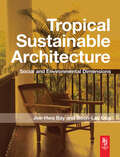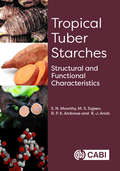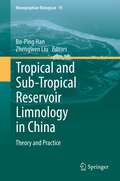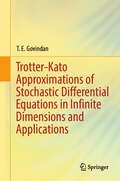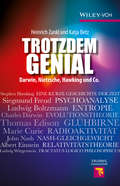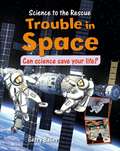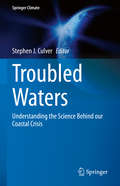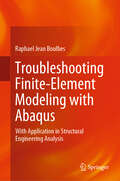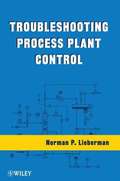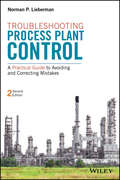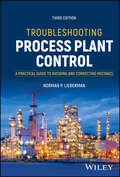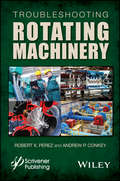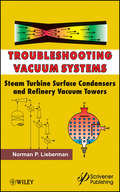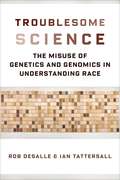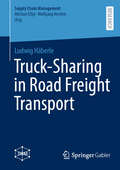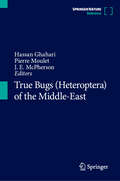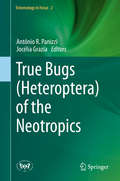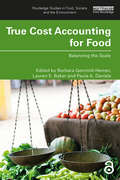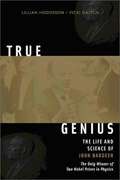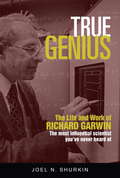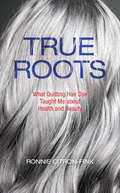- Table View
- List View
Tropical Sustainable Architecture
by Boon Lay Ong Joo-Hwa BayThe tropical belt – where large areas of South East Asia, India, Africa and parts of both North and South America are located – forms the biggest landmass in the world and has one of the highest numbers of rapidly developing cities. Coincidentally, architecture in these regions shares common problems, the most easily identifiable being the tropical conditions of climate and natural environment. The context for architecture here is fraught with conflicts between tradition and modernization, massive influx of rural poor into urban areas, poorly managed rapid urban development as well as the cultural and social strain of globalization. Many local and overseas architects, planners and city fathers are interested in the social and environmental dimensions of these areas that contribute towards short terms solutions and long term sustainable developments. This book, developed from the first conference of the International Network for Tropical Architecture, supplies a wealth of information from experts worldwide covering the cultural, environmental and technical aspects of thinking, researching and designing for the tropics.
Tropical Tuber Starches: Structural and Functional Characteristics
by Dr S N Moorthy Dr M S Sajeev Dr R P Ambrose R J AnishThis book provides comprehensive and up-to-date knowledge relating to the morphological, structural, and functional characteristics of tuber starches, particularly in relation to their applications in food and industry. In recent years there has been significant progress and extensive research conducted on tropical root starches and especially on some of the lesser known tuber crop starches. There has also been a shift towards using biomaterials in place of synthetic materials in various applications. As researchers investigate the availability of natural products with similar properties, starch has been identified as a reliable alternative to these synthetic materials. Reflecting the growing body of research, Tropical Tuber Starches: - Explores the structure, properties and applications of tropical root and tuber starches (cassava, sweet potato, aroids, yams and other minor tuber crops) - Includes a chapter on the methodology for starch characterisation - Covers patents on starch-based products and the commercial potential of tropical root starches A valuable resource for researchers and students, plant breeders, and commercial producers working with, or considering working with, tropical tuber starches.
Tropical and Sub-Tropical Reservoir Limnology in China
by Bo-Ping Han Zhengwen LiuReservoirs are specific aquatic ecosystems and have complex behaviors of both natural lakes and rivers, regulated significantly by their functions such as flood controlling, hydropower generation, irrigation and fishery. This volume offers a general description of reservoir limnology in tropical and subtropical China. It functions as a window opening to all the aquatic scientists with a main focus on reservoirs in southern China and at the same time also covering several important, large reservoirs such as the Three Gorge Reservoir and Danjiangko Reservoir. Topics discussed are zooplankton, phytoplankton and zoobenthos communities, cyanobateria, nutrient budget, sediments, biogeochemical cycling of mercury, fishery and eutrophication.
Trot, Pony! (National Geographic Kids Readers)
by Shira EvansTrot, prance, and jump with ponies! Young readers will meet lots of different kinds of ponies and learn what they do. Through text features such as the vocabulary tree and the wrap-up activity, kids will be introduced to vocabulary in concept groups—helping them make connections between words and expand their understanding of the world.
Trotter-Kato Approximations of Stochastic Differential Equations in Infinite Dimensions and Applications
by T. E. GovindanThis is the first comprehensive book on Trotter-Kato approximations of stochastic differential equations (SDEs) in infinite dimensions and applications. This research monograph brings together the varied literature on this topic since 1985 when such a study was initiated. The author provides a clear and systematic introduction to the theory of Trotter-Kato approximations of SDEs and also presents its applications to practical topics such as stochastic stability and stochastic optimal control. The theory assimilated here is developed slowly and methodically in digestive pieces.The book begins with a motivational chapter introducing several different models that highlight the importance of the theory on abstract SDEs that will be considered in the subsequent chapters. The author next introduces the necessary mathematical background and then leads the reader into the main discussion of the monograph, namely, the Trotter-Kato approximations of many classes of SDEs in Hilbert spaces, Trotter-Kato approximations of SDEs in UMD Banach spaces and some of their applications. Most of the results presented in the main chapters appear for the first time in a book form. The monograph also contains many illustrative examples on stochastic partial differential equations and one in finance as an application of the Trotter-Kato formula. The key steps are included in all proofs which will help the reader to get a real insight into the theory of Trotter-Kato approximations and its use. This book is intended for researchers and graduate students in mathematics specializing in probability theory. It will also be useful to numerical analysts, engineers, physicists and practitioners who are interested in applying the theory of stochastic evolution equations. Since the approach is based mainly in semigroup theory, it is accessible to a wider audience including non-specialists in stochastic processes.
Trotzdem Genial: Darwin, Nietzsche, Hawking und Co.
by Heinrich Zankl Katja BetzStephen Hawking ist wohl der bekannteste Wissenschaftler mit Handicap weltweit. <P><P>Doch es gibt sehr viele große Denker und Forscher, die körperlich oder psychisch beeinträchtigt waren: Darwins Symptome deuten auf eine Nerven?schwäche hin, bei Einstein vermuten Wissenschaftler eine Variante des Asperger-Syndroms, Freud war suchtkrank und Edison schwerhörig, Marx litt unter Karbunkeln, und Nietzsches Persönlichkeitsverfall könnte an einer Neurosyphilis gelegen haben. DAS >WHO IS WHO Die etwas anderen Paralympics, die uns Zankl und Betz hier präsentieren, sind beeindruckend und überraschend zugleich. Denn in Trotzdem genial ist das Who is Who der Geistes- und Naturwissenschaftler versammelt. Da lernen wir etwa den Kinderarzt Oliver Semler kennen, der zur Glasknochenkrankheit forscht, an der er auch selbst erkrankt ist, oder die Tierwissenschaftlerin Temple Grandin. Sie ist Autistin und bemerkte, dass sie mit Tieren viel besser umgehen konnte als mit Menschen. Sie entwickelte unter Anderem tiergerechtere Anlagen zur Haltung von Kühen. Durch die Verfilmung ihres Lebens wurde sie einem breiten Publikum bekannt, genauso wie John Nash, der schizophrene Nobelpreisträger und Mitentwickler der Spieltheorie.
Trouble in Space (Science to the Rescue)
by Felicia Law Gerry BaileyIn this exciting title, Joe and Dr. Bea blast off on an expedition into space! Join the two scientists as they explore life on board the International Space Station (ISS), experience a spacewalk, study the planets, and discover the beauty and dangers of our solar system.
Troubled Waters: Understanding the Science Behind our Coastal Crisis (Springer Climate)
by Stephen J. CulverThe book communicates coastal geology such that the reader gets a better understanding of how scientists work and how scientific knowledge is acquired and how it progresses. It presents the human side of geologic research, including missteps, in this case, research on coastal change of the recent past, the present, and the near future. The audience for this volume is the general public, coastal managers, politicians, and decision makers in general, in the coastal realm. But the implications of this work with regard to future climate change and human responses are relevant globally.
Troubleshooting Electric Motors (Fourth Edition)
by Thomas E. Proctor Glenn A. MazurTroubleshooting Electric Motors is a text/workbook that includes information and procedures for troubleshooting motors and motor circuits commonly used in industrial applications. It includes all aspects of troubleshooting, from locating the problem using test instruments to selecting the correct motor for replacement. Each chapter concludes with activities and trade tests to help reinforce troubleshooting concepts. This edition includes an introduction to test instruments, AC and DC generators, and servo-motors. Information on energy-efficient motors and safety has been expanded.
Troubleshooting Finite-Element Modeling with Abaqus: With Application in Structural Engineering Analysis
by Raphael Jean BoulbesThis book gives Abaqus users who make use of finite-element models in academic or practitioner-based research the in-depth program knowledge that allows them to debug a structural analysis model. The book provides many methods and guidelines for different analysis types and modes, that will help readers to solve problems that can arise with Abaqus if a structural model fails to converge to a solution. The use of Abaqus affords a general checklist approach to debugging analysis models, which can also be applied to structural analysis.The author uses step-by-step methods and detailed explanations of special features in order to identify the solutions to a variety of problems with finite-element models. The book promotes: • a diagnostic mode of thinking concerning error messages; • better material definition and the writing of user material subroutines; • work with the Abaqus mesher and best practice in doing so; • the writing of user element subroutines and contact features with convergence issues; and• consideration of hardware and software issues and a Windows HPC cluster solution.The methods and information provided facilitate job diagnostics and help to obtain converged solutions for finite-element models regarding structural component assemblies in static or dynamic analysis. The troubleshooting advice ensures that these solutions are both high-quality and cost-effective according to practical experience. The book offers an in-depth guide for students learning about Abaqus, as each problem and solution are complemented by examples and straightforward explanations. It is also useful for academics and structural engineers wishing to debug Abaqus models on the basis of error and warning messages that arise during finite-element modelling processing.
Troubleshooting Process Plant Control
by Norman P. LiebermanThe book focuses on process control in the petroleum and refinery industries, with an emphasis on problem solving. The author explores various real life examples and relays the lessons learned from his career in this area. He explains many new yet straightforward concepts without the use of complex mathematics. This handy go-to emphasizes single and well-established process engineering principles that will help working engineers and operators switch manual control loops to automatic control.
Troubleshooting Process Plant Control: A Practical Guide to Avoiding and Correcting Mistakes
by Norman P. LiebermanExamines real life problems and solutions for operators and engineers running process controls Expands on the first book with the addition of five new chapters as well as new troubleshooting examples Written for the working operator and engineer, with straightforward instruction not hinged on complex math Includes real-life examples of control problems that commonly arise and how to fix them Emphasizes single and well-established process engineering principles that will help working engineers and operators switch manual control loops to automatic control
Troubleshooting Process Plant Control: A Practical Guide to Avoiding and Correcting Mistakes
by Norman P. LiebermanA practical and engaging guide to running process controls in petrochemical plants and refineries Process control is an area of study dealing with controlling variables that emerge in process plants, such as chemical plants, wastewater purification plants, or refineries. Existing guides to process control are numerous, but they tend to be associated with control engineering, which is more mathematical and theoretical. There is an urgent need for a more straightforward and concrete guide for practical use in petrochemical plants and refineries. Troubleshooting Process Plant Control meets this need with a work dedicated to real-life solutions and problem solving. Rooted in real-world examples and the career experience of the author, it largely avoids complex mathematics in favor of practical, well-established process engineering principles. Now fully updated to reflect the latest best practices and developments in the field, it is indispensable for process controllers in active plants of all kinds. Readers of the third edition will also find: New chapters on alarm disabling, spectrometer use, and reducing CO2 emissionsAdditional novel examples throughoutGuidelines for using spectrometers to directly control reflux rates and steam flow to reboilers Troubleshooting Process Plant Control is ideal for practicing engineers and other technical professionals working in process facilities, as well as advanced students taking professional training courses in these fields.
Troubleshooting Rotating Machinery: Including Centrifugal Pumps and Compressors, Reciprocating Pumps and Compressors, Fans, Steam Turbines, Electric Motors, and More
by Robert X. Perez Andrew P. ConkeyProcess machines are critical to the profitability of processes. Safe, efficient and reliable machines are required to maintain dependable manufacturing processes that can create saleable, on-spec product on time, and at the desired production rate. As the wards of process machinery, we wish to keep our equipment in serviceable condition. One of the most challenging aspects of a machinery professional or operator's job is deciding whether an operating machine should be shut down due to a perceived problem or be allowed to keep operating. If he or she wrongly recommends a repair be conducted, the remaining useful machine life is wasted, but if he or she is right, they can save the organization from severe consequences, such as product releases, fires, costly secondary machine damage, etc. This economic balancing act is at the heart of all machinery assessments. Troubleshooting is part science and part art. Simple troubleshooting tables or decision trees are rarely effective in solving complex, real-world machine problems. For this reason, the authors want to offer a novel way to attack machinery issues that can adversely affect the reliability and efficiency of your plant processes. The methodology presented in this book is not a rigid "cook book" approach but rather a flexible and dynamic process aimed at exploring process plant machines holistically, in order uncover the true nature the problem at hand.
Troubleshooting Vacuum Systems
by Norman P. LiebermanVacuum systems are in wide spread use in the petrochemical plants, petroleum refineries and power generation plants. <P><P>The existing texts on this subject are theoretical in nature and only deal with how the equipment functions when in good mechanical conditions, from the viewpoint of the equipment vendor. In this much-anticipated volume, one of the most well-respected and prolific process engineers in the world takes on troubleshooting vacuum systems, and especially steam ejectors, an extremely complex and difficult subject that greatly effects the profitability of the majority of the world's refineries.
Troubleshooting and Problem-Solving in the IVF Laboratory
by Kay Elder Elder, Kay and Van den Bergh, Marc and Woodward, Bryan Van den Bergh, Marc Bryan WoodwardMaintaining consistent and reliably high success rates is a daily challenge for every IVF laboratory. This step-by-step guide is an essential aid in navigating the complex maze of physical, chemical, biological, and logistic parameters that underpin successful gamete and embryo culture: temperature, pH, osmolality, gas supplies, air quality, light exposure, infections, managing supplies, personnel, as well as overall quality control. Numerous real-life troubleshooting case reports are presented, identifying all aspects necessary for troubleshooting. Process maps and flow charts accompanying each chapter offer a logical and systematic approach to problem solving in the laboratory. This is an essential resource for scientists in assisted reproductive technology and specialists in reproductive biology and medicine, helping IVF clinics to achieve the dream of every infertile couple: the birth of a healthy child.
Troublesome Science: The Misuse of Genetics and Genomics in Understanding Race (Race, Inequality, and Health #2)
by Ian Tattersall Rob DeSalleIt is well established that all humans today, wherever they live, belong to one single species. Yet even many people who claim to abhor racism take for granted that human “races” have a biological reality. In Troublesome Science, Rob DeSalle and Ian Tattersall provide a lucid and forceful critique of how scientific tools have been misused to uphold misguided racial categorizations.DeSalle and Tattersall argue that taxonomy, the scientific classification of organisms, provides an antidote to the myth of race’s biological basis. They explain how taxonomists do their science—how to identify a species and to understand the relationships among different species and the variants within them. DeSalle and Tattersall also detail the use of genetic data to trace human origins and look at how scientists have attempted to recognize discrete populations within Homo sapiens. Troublesome Science demonstrates conclusively that modern genetic tools, when applied correctly to the study of human variety, fail to find genuine differences. While the diversity that exists within our species is a real phenomenon, it nevertheless defeats any systematic attempt to recognize discrete units within it. The stark lines that humans insist on drawing between their own groups and others are nothing but a mixture of imagination and ideology. Troublesome Science is an important call for researchers, journalists, and citizens to cast aside the belief that race has a biological meaning, for the sake of social justice and sound science alike.
Truck-Sharing in Road Freight Transport (Supply Chain Management)
by Ludwig HäberleHow can logistics companies use truck-sharing to boost efficiency and flexibility in freight transport operations? This book is the first to present a comprehensive concept for the application of sharing economy principles to road freight transport. Despite mounting pressure on the industry, including driver shortage, tight margins and efficiency deficits, shared mobility remains largely untapped in freight transport. This book introduces truck-sharing as a new strategic approach for unlocking underutilised capacity and increasing operational flexibility. The analysis is grounded in real-world practice, integrating the engaged scholarship approach with backcasting methodology to explore use cases, implementation drivers and barriers, and strategic implications. It integrates insights from horizontal cooperation and the sharing economy into a forward-looking, design-oriented framework tailored for logistics decision-makers. Addressing transport operators, researchers, and policymakers, this book offers clear, actionable recommendations showing how truck-sharing can reduce costs, downtime, and environmental impact. It sets a new direction for more efficient and collaborative freight transport across Europe.
True Bugs (Heteroptera) of the Middle-East
by J. E. McPherson Hassan Ghahari Pierre MouletThis reference guide covers information on the true bugs (Heteroptera) of Middle East and includes taxonomy, general biology, economic importance, applied aspects, and distributional data. It also includes up-to-date reviews of the literature on the Heteroptera of the Middle East. The book represents a clear guide for future research in heteropteran biology. Apart from providing a taxonomic treatment of all the families known from the Middle East, information is provided on Iranian and general geographic distributions, bionomics, ecology, natural enemies, prey records, and plant associations for the various species. General discussion also is included on morphology, economic importance, family characters of each group, and affinity with related groups. This book includes detailed information on more than 2,000 species of the Middle East Heteroptera belonging to 58 families. An exhaustive bibliography (over 4,000) has been provided to facilitate studies of chosen aspects of the various species. Up-to-date information for the various species has been provided as far as possible. The book contains the contributions of 37 heteropteran specialists from 17 countries. This book is of interest to teachers, researchers, and masters and Ph. D students of entomology, biosciences, agriculture, biological control, IPM (Integrated Pest Management), and environmental sciences. Also, the book serves as additional reading material for undergraduate and graduate students of the mentioned scientific fields. National and international entomological and agricultural scientists may also find the book to be a useful read as well as those individuals who are active in medical, urban, and forensic entomology because there are several heteropteran pests in these fields.
True Bugs (Heteroptera) of the Neotropics
by Antônio R. Panizzi Jocélia GraziaTrue bugs (Heteroptera) are a diverse and complex group of plant-feeding and predatory insects important to food production, human health, the global economy and the environment. Within the nearly 43,000 species described around the world, Neotropical true bugs are particularly diverse, and much remains to be discovered about their biology and relations with other species. Inspired by the need for a comprehensive assessment, True Bugs (Heteroptera) of the Neotropics is the most complete and thorough review ever published. Experts in each of the seven infraorders have drawn together the scattered literature to provide detailed treatments of each major taxon. The most common and important species as well as select lesser known species in each major family are covered, highlighting morphology, classification, biology and ecology. The numerous color illustrations highlight key species and their adaptations, and importance to basic and applied sciences is discussed. Each chapter is based on an up-to-date review of the literature, and with a bibliography of more than 3,000 references, readers are presented with an unprecedented and vital and timely account of the true bugs of the Neotropical Region.
True Cost Accounting for Food: Balancing the Scale (Routledge Studies in Food, Society and the Environment)
by Barbara Gemmill-HerrenThis book explains how True Cost Accounting is an effective tool we can use to address the pervasive imbalance in our food system. Calls are coming from all quarters that the food system is broken and needs a radical transformation. A system that feeds many yet continues to create both extreme hunger and diet-related diseases, and one which has significant environmental impacts, is not serving the world adequately. This volume argues that True Cost Accounting in our food system can create a framework for a systemic shift. What sounds on the surface like a practice relegated to accountants is ultimately a call for a new lens on the valuation of food and a new relationship with the food we eat, starting with the reform of a system out of balance. From the true cost of corn, rice and water, to incentives for soil health, the chapters economically compare conventional and regenerative, more equitable farming practices in and food system structures, including taking an unflinching look at the true cost of cheap labour. Overall, this volume points towards the potential for our food system to be more human-centred than profit-centred and one that has a more respectful relationship to the planet. It sets forth a path forward based on True Cost Accounting for food. This path seeks to fix our current food metrics, in policy and in practice, by applying a holistic lens that evaluates the actual costs and benefits of different food systems, and the impacts and dependencies between natural systems, human systems, agriculture and food systems. This volume is essential reading for professionals and policymakers involved in developing and reforming the food system, as well as students and scholars working on food policy, food systems and sustainability.
True Enough
by Catherine Z. ElginThe development of an epistemology that explains how science and art embody and convey understanding. Philosophy valorizes truth, holding that there can never be epistemically good reasons to accept a known falsehood, or to accept modes of justification that are not truth conducive. How can this stance account for the epistemic standing of science, which unabashedly relies on models, idealizations, and thought experiments that are known not to be true? In True Enough, Catherine Elgin argues that we should not assume that the inaccuracy of models and idealizations constitutes an inadequacy. To the contrary, their divergence from truth or representational accuracy fosters their epistemic functioning. When effective, models and idealizations are, Elgin contends, felicitous falsehoods that exemplify features of the phenomena they bear on. Because works of art deploy the same sorts of felicitous falsehoods, she argues, they also advance understanding. Elgin develops a holistic epistemology that focuses on the understanding of broad ranges of phenomena rather than knowledge of individual facts. Epistemic acceptability, she maintains, is a matter not of truth-conduciveness, but of what would be reflectively endorsed by the members of an idealized epistemic community—a quasi-Kantian realm of epistemic ends.
True Genius: The Life And Science Of John Bardeen
by Lillian Hoddeson Vicki DaitchWhat is genius? Define it. Now think of scientists who embody the concept of genius. Does the name John Bardeen spring to mind? Indeed, have you ever heard of him?Like so much in modern life, immediate name recognition often rests on a cult of personality. We know Einstein, for example, not just for his tremendous contributions to science, but also because he was a character, who loved to mug for the camera. And our continuing fascination with Richard Feynman is not exclusively based on his body of work; it is in large measure tied to his flamboyant nature and offbeat sense of humor.These men, and their outsize personalities, have come to erroneously symbolize the true nature of genius and creativity. We picture them born brilliant, instantly larger than life. But is that an accurate picture of genius? What of others who are equal in stature to these icons of science, but whom history has awarded only a nod because they did not readily engage the public? Could a person qualify as a bona fide genius if he was a regular Joe?The answer may rest in the story of John Bardeen.John Bardeen was the first person to have been awarded two Nobel Prizes in the same field. He shared one with William Shockley and Walter Brattain for the invention of the transistor. But it was the charismatic Shockley who garnered all the attention, primarily for his Hollywood ways and notorious views on race and intelligence.Bardeen’s second Nobel Prize was awarded for the development of a theory of superconductivity, a feat that had eluded the best efforts of leading theorists—including Albert Einstein, Neils Bohr, Werner Heisenberg, and Richard Feynman. Arguably, Bardeen’s work changed the world in more ways than that of any other scientific genius of his time. Yet while every school child knows of Einstein, few people have heard of John Bardeen. Why is this the case?Perhaps because Bardeen differs radically from the popular stereotype of genius. He was a modest, mumbling Midwesterner, an ordinary person who worked hard and had a knack for physics and mathematics. He liked to picnic with his family, collaborate quietly with colleagues, or play a round of golf. None of that was newsworthy, so the media, and consequently the public, ignored him.John Bardeen simply fits a new profile of genius. Through an exploration of his science as well as his life, a fresh and thoroughly engaging portrait of genius and the nature of creativity emerges. This perspective will have readers looking anew at what it truly means to be a genius.
True Genius: The Life and Work of Richard Garwin, the Most Influential Scientist You've Never Heard of
by Joel ShurkinRichard Garwin was awarded the Presidential Medal of Freedom by President Barack Obama Called a "true genius" by Enrico Fermi, Richard Garwin has influenced modern life in far-reaching ways, yet he is hardly known outside the physics community. This is the first biography of one of America's great minds--a top physicist, a brilliant technological innovator, and a trusted advisor of presidents for sixty years. Among his many contributions to modern technology are innovations we now take for granted: air-traffic control systems, touch screens, color monitors, laser printers, GPS satellite navigation, and many other facets of everyday contemporary life.But certainly his most important work has been on behalf of nuclear disarmament. As a key member of the Los Alamos team that developed the hydrogen bomb (he created the final design), Garwin subsequently devoted much of his career to ensuring that nuclear weapons never again be used. He has spent hundreds of hours testifying before Congress, serving on government advisory committees, and doing work that is still classified, all the while working for IBM as a researcher. A genuine polymath, his ideas extend from propulsion systems for interplanetary flight to preventing flu epidemics. Never shy about offering his opinions, even to rigid government bureaucracies unwilling to change, Garwin continues to show leaders how to do the smart thing. The world is a more interesting and safer place because of his many accomplishments.
True Roots: What Quitting Hair Dye Taught Me about Health and Beauty
by Ronnie Citron-FinkLike 75% of American women, Ronnie Citron-Fink dyed her hair, visiting the salon every few weeks to hide gray roots in her signature dark brown mane. She wanted to look attractive, professional, young. Yet as a journalist covering health and the environment, she knew something wasn't right. All those unpronounceable chemical names on the back of the hair dye box were far from natural. Were her recurring headaches and allergies telltale signs that the dye offered the illusion of health, all the while undermining it?So after twenty-five years of coloring, Ronnie took a leap and decided to ditch the dye. Suddenly everyone, from friends and family to rank strangers, seemed to have questions about her hair. How'd you do it? Are you doing that on purpose? Are you OK? Armed with a mantra that explained her reasons for going gray—the upkeep, the cost, the chemicals—Ronnie started to ask her own questions.What are the risks of coloring? Why are hair dye companies allowed to use chemicals that may be harmful? Are there safer alternatives? Maybe most importantly, why do women feel compelled to color? Will I still feel like me when I have gray hair?True Roots follows Ronnie's journey from dark dyes to a silver crown of glory, from fear of aging to embracing natural beauty. Along the way, readers will learn how to protect themselves, whether by transitioning to their natural color or switching to safer products. Like Ronnie, women of all ages can discover their own hair story, one built on individuality, health, and truth.
